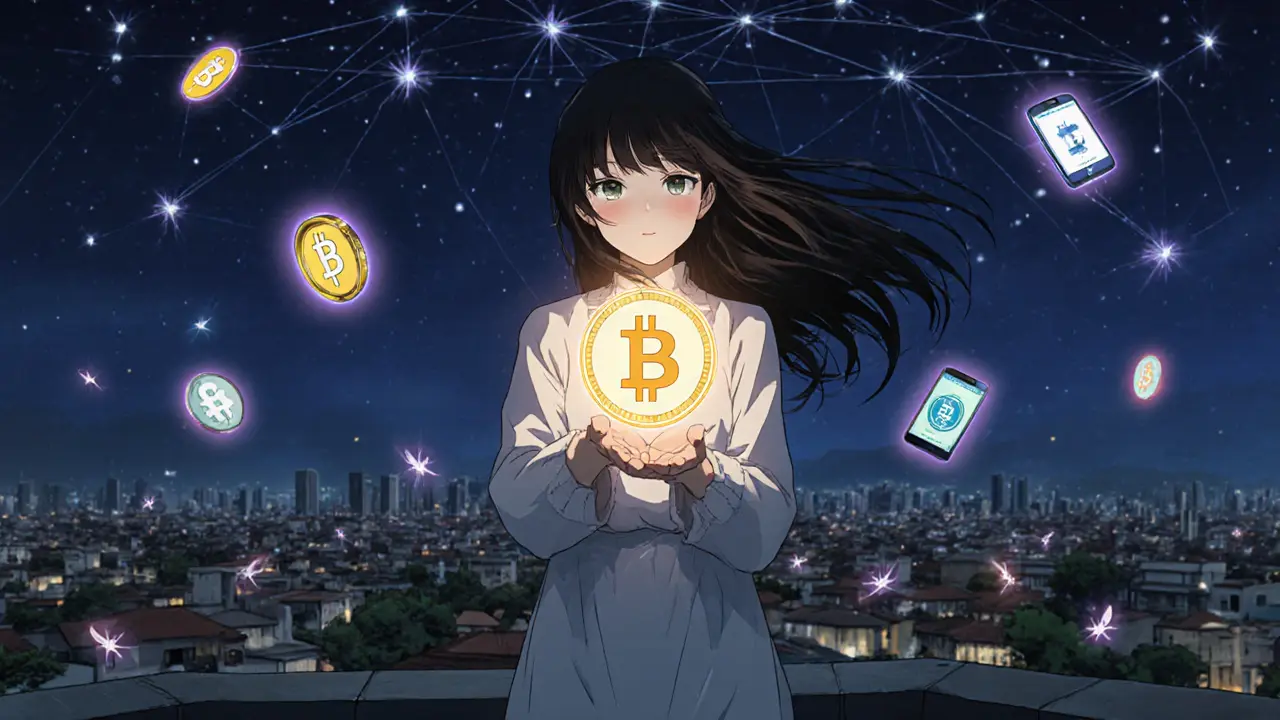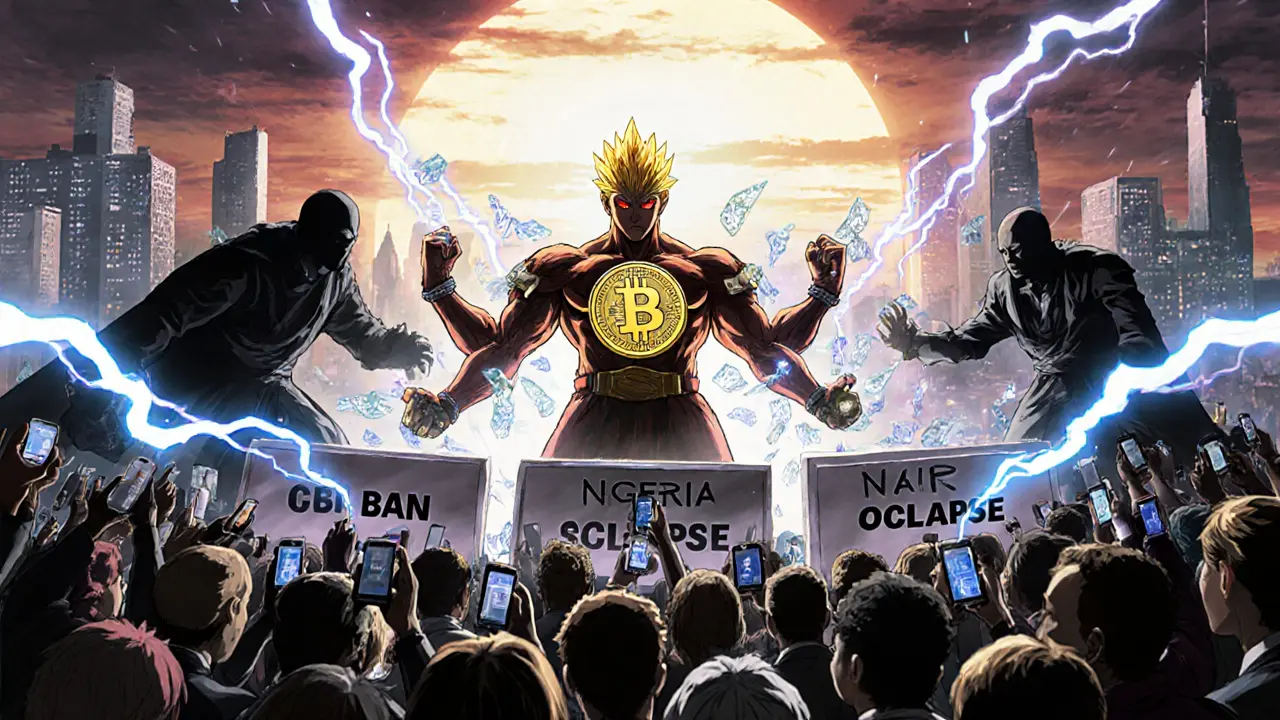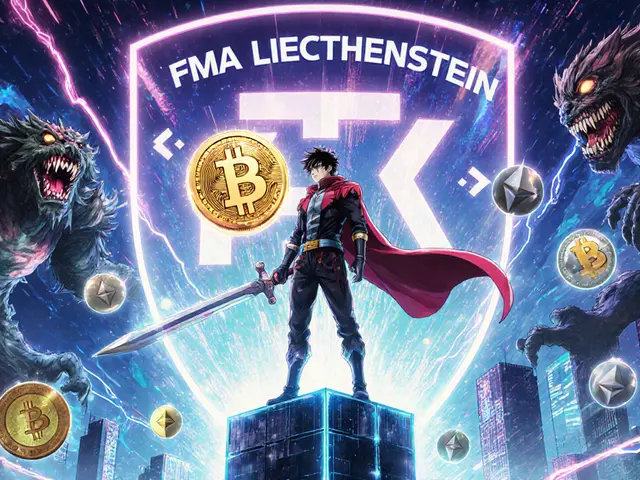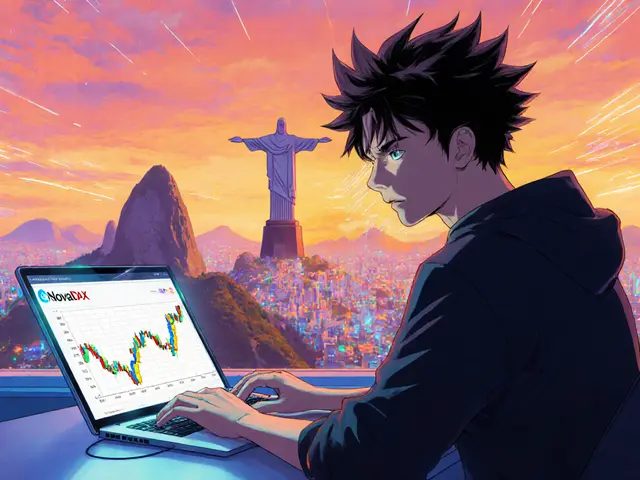Remittance Savings Calculator
Send Money to Nigeria: Calculate Your Savings
Nigerians save 60-80% on remittance fees using crypto compared to traditional services like Western Union. Based on current data showing 8% fees for traditional transfers vs. <2% for crypto.
Nigeria isn't just using crypto-it's redefining how the world sees it
Most countries try to stop crypto. Nigeria didn’t. Instead, it turned a ban into a breakthrough. While governments elsewhere cracked down on digital currencies, Nigerians built a $59 billion peer-to-peer (P2P) crypto economy in just one year. They didn’t wait for permission. They didn’t rely on banks. They traded directly-with each other, across borders, using nothing but smartphones and internet access. And now, the world is watching.
In 2024, Nigeria ranked second globally in crypto adoption according to Cornell Business, and by September 2025, Chainalysis still placed it in the top six. But rankings don’t tell the full story. What matters is why. Nigeria’s rise isn’t about speculation. It’s about survival.
When banks say no, people find another way
In 2017, the Central Bank of Nigeria told commercial banks to cut off crypto businesses. The goal? To stop capital flight and protect the naira. Instead, it forced millions into P2P trading. People stopped waiting for banks to fix things. They started trading directly with neighbors, friends, and strangers across WhatsApp, Telegram, and local exchanges like Quidax and Patricia.
It wasn’t easy. Traders had to learn how to verify identities, match prices manually, and avoid scams. But the payoff was clear: access to dollars, euros, and stablecoins when the naira kept losing value. By 2020, over 32% of Nigerians had used crypto. Today, that number is growing fast-with an estimated 22 million people expected to be using digital assets by 2025.
That’s 10% of the entire population. Compare that to the U.S., where crypto adoption hovers around 8%, or the UK at 7%. Nigeria’s penetration rate isn’t just high-it’s exceptional for a country where nearly 36% of adults still don’t have a bank account.
The naira’s collapse made crypto the only safe option
Why crypto? Because the naira lost over 75% of its value against the U.S. dollar between 2016 and 2023. Inflation hit 24% in 2023. Salaries couldn’t keep up. Savings evaporated. People needed something that wouldn’t disappear overnight.
Bitcoin became more than a digital asset-it became a store of value. Stablecoins like USDT and USDC became lifelines. Nigerians bought them with naira on P2P platforms, then sent them abroad to pay for education, medical care, or family support. Remittances that used to cost 8% in fees now cost less than 2%. Some users report savings of 60-80% compared to Western Union or bank wire transfers.
It’s not just about sending money home. It’s about staying in control. When the government freezes accounts or devalues currency, crypto gives people autonomy. And that’s powerful.

From underground to official: The regulatory shift
For years, crypto in Nigeria operated in the shadows. But in late 2023, everything changed. The Central Bank lifted its ban on banks servicing licensed crypto exchanges. Suddenly, platforms like Quidax and Luno could open bank accounts. People could deposit naira directly into exchanges. The ecosystem went from illegal to regulated overnight.
Then came the Investments and Securities Act of 2025. For the first time, digital assets were officially recognized as financial securities in Nigeria. This wasn’t just a policy tweak-it was a legal revolution. It meant crypto exchanges had to follow anti-money laundering rules, verify users, and report transactions. It meant legitimacy.
Even the Nigeria Inter-Bank Settlement System (NIBSS) got involved. In early 2025, it partnered with Zone’s blockchain network to modernize interbank payments. Fraud dropped. Settlements became faster. The same infrastructure that once blocked crypto was now helping it scale.
It’s not just Bitcoin-Nigeria’s crypto ecosystem is diverse
Most people think Nigeria only trades Bitcoin. That’s outdated. While BTC/Naira is still the most popular pair, traders also use Dash, Ripple (XRP), and stablecoins like USDT and USDC. Why? Because each serves a different need.
Dash offers instant transactions with low fees-perfect for daily purchases. Ripple helps with cross-border business payments. Stablecoins protect against volatility. And Bitcoin? It’s the long-term hedge. Nigerians don’t just gamble on price swings. They use crypto as a tool: for savings, commerce, and security.
Local exchanges have adapted. Quidax offers guides in English, Yoruba, and Igbo. Patricia has tutorials on YouTube in Pidgin English. Telegram groups and WhatsApp communities are full of people helping newcomers avoid scams. The learning curve isn’t steep-most users get comfortable in 2-4 weeks. Mastering advanced P2P strategies takes a few months, but the community makes it possible.

The rise of fintech is tied to crypto
Nigeria’s crypto boom didn’t happen in isolation. It fueled a fintech revolution. Moniepoint, a payments startup that lets small businesses accept digital payments, became Africa’s first crypto-linked unicorn in 2025, hitting a $1 billion valuation after Google invested. Why? Because crypto made it possible to serve millions of unbanked merchants without needing physical branches.
Platforms like Opay and PalmPay now let users buy crypto directly from their apps. Mobile money wallets and crypto wallets are merging. The line between traditional finance and digital assets is disappearing.
This isn’t just about money. It’s about infrastructure. Nigeria’s young population-median age is 18-grew up with phones, not bank tellers. They don’t want to wait weeks for a loan. They want instant access. Crypto delivers that.
What’s next? Hybrid finance is coming
Nigeria’s crypto future won’t be fully decentralized. It won’t be fully centralized either. It’ll be both.
On one side, P2P trading will keep growing. It’s too useful, too embedded in daily life to disappear. On the other, institutions will keep integrating. Banks will offer crypto custody. Regulators will demand compliance. The CBN might even launch its own digital currency, the eNaira, but that won’t kill P2P-it’ll coexist with it.
Analysts predict Nigeria will become Africa’s largest crypto economy by transaction volume within two years. The real question isn’t whether it can sustain this growth-it’s whether other countries will learn from it.
Challenges remain, but so does momentum
It’s not perfect. Scams still exist. Some users lose money to fake platforms. Regulatory uncertainty lingers-what if the next government reverses course? And international pressure is growing. The Financial Action Task Force (FATF) has flagged Nigeria for anti-money laundering gaps.
But Nigerians aren’t waiting for perfect conditions. They’re fixing problems as they go. Local groups run free crypto literacy workshops. Schools are starting to teach blockchain basics. Parents teach their kids how to secure wallets. The culture has shifted.
Crypto in Nigeria isn’t a trend. It’s a response. A smart, resilient, community-driven response to broken systems. And that’s why it leads the world.
Why does Nigeria rank so high in P2P crypto adoption?
Nigeria leads because its people use crypto out of necessity-not speculation. High inflation, a collapsing naira, limited access to foreign currency, and a history of banking restrictions pushed millions into peer-to-peer trading. With 36% of adults unbanked and remittance fees as high as 8%, crypto offered a cheaper, faster, and more reliable alternative. The result? Over $59 billion in P2P transactions in just one year.
Is crypto legal in Nigeria?
Yes, but with rules. The Central Bank of Nigeria lifted its 2017 ban on banks servicing crypto businesses in late 2023. In 2025, the Investments and Securities Act officially recognized cryptocurrencies as financial securities. Licensed exchanges now operate legally, and users must go through KYC verification. Crypto isn’t banned-it’s regulated.
What cryptocurrencies do Nigerians trade the most?
Bitcoin (BTC) is still the most traded pair against the naira, but stablecoins like USDT and USDC are growing fast because they hold steady value. Dash and Ripple (XRP) are also popular for fast, low-cost transactions. Many users hold a mix: Bitcoin for savings, stablecoins for daily use, and altcoins for specific payments.
How do Nigerians buy crypto without a bank account?
Even without a bank account, Nigerians use mobile money, cash deposits at agent locations, and peer-to-peer platforms. On apps like Quidax or Patricia, users can find sellers who accept cash via bank transfer, ATM deposit, or even in-person meetups. Many P2P trades happen through WhatsApp or Telegram, where buyers and sellers agree on price and payment method directly.
Is crypto in Nigeria safe from scams?
There are risks. Early scams like MMM and OneCoin damaged trust. But today, licensed exchanges require identity verification, and community-led education has improved awareness. Users are advised to use trusted platforms, never send crypto to unknown addresses, and avoid ‘guaranteed returns.’ Most losses now come from human error-not platform failure.
Will the eNaira replace crypto in Nigeria?
No-not yet, and maybe never. The eNaira is a government-controlled digital currency. Crypto gives users control over their money without relying on the state. Many Nigerians see crypto as a check on government power. While the eNaira may handle some payments, P2P crypto will remain popular for savings, international transfers, and avoiding inflation.











Comments (30)
Kaela Coren
November 2, 2025 AT 20:44 PMThe scale of this organic financial innovation is staggering. What’s particularly compelling is how Nigeria’s regulatory evolution mirrors the grassroots adoption-rather than leading it. The CBN didn’t anticipate this; they were forced to adapt. That’s a rare case of policy catching up to human behavior, not the other way around.
It’s also worth noting that this isn’t a tech elite phenomenon. It’s grandmothers sending remittances via WhatsApp, market vendors accepting USDT, students paying for overseas tuition without a single bank branch in sight. The infrastructure is human, not algorithmic.
This isn’t crypto as a speculative asset. It’s crypto as a public utility.
And yet, the global narrative still frames it as ‘emerging market chaos’ instead of ‘adaptive financial sovereignty.’
Nabil ben Salah Nasri
November 3, 2025 AT 19:11 PMThis is honestly one of the most inspiring things I’ve read all year 😭👏
Nigeria didn’t wait for permission to build a better system-they just did it. No hand-holding. No subsidies. Just people with phones and a will to survive.
And the fact that they’re using Pidgin English tutorials and WhatsApp groups to teach crypto literacy? That’s next-level community resilience 🙌
Why can’t more countries learn from this instead of just copying US/EU regulatory templates? 🤔
alvin Bachtiar
November 4, 2025 AT 05:17 AMLet’s be real: this isn’t ‘financial sovereignty’-it’s desperation dressed up as innovation. The naira collapsed because of decades of mismanagement, corruption, and reckless monetary policy. Crypto isn’t the solution-it’s a Band-Aid on a hemorrhaging artery.
And don’t get me started on ‘stablecoins as lifelines.’ You’re literally trusting an unregulated, off-shore corporate entity (Tether) to maintain your savings. That’s not freedom-that’s replacing one centralized authority with another, less accountable one.
Also, 22 million users? That’s 10% of Nigeria’s population. But what’s the real penetration of *active, non-scammed* users? Probably 3%. The rest are either confused or exploited.
Don’t romanticize survival. Fix the system.
Also, ‘DASH for daily purchases’? LOL. It’s not even top 20 by market cap. Who are these people quoting this like it’s gospel?
Josh Serum
November 5, 2025 AT 18:05 PMOkay but seriously-why are we still acting like this is some kind of miracle? Nigeria has a population of 220 million. 22 million crypto users? That’s barely 10%. Meanwhile, the U.S. has 80 million. So if you’re gonna compare adoption rates, maybe look at absolute numbers too? 😅
Also, people keep saying ‘they didn’t wait for banks’-well, duh. Banks were actively blocking them. Of course they found another way. That’s not genius, that’s basic human behavior.
And don’t even get me started on ‘crypto as a store of value.’ Bitcoin’s up 300% this year. That’s not stability-that’s gambling with your rent money.
Also, the eNaira? It’s basically a blockchain version of the naira. Why would anyone trust that? The same people who devalued the currency are running it. 😒
DeeDee Kallam
November 7, 2025 AT 10:56 AMok but like... why is everyone acting like nigeria is the only country that does this?? i mean i know ppl in mexico and argentina who use crypto too, but no one talks about them?? like, is it because theyre black?? idk. just feels like the media loves a ‘african miracle’ story but ignores latam. just saying. 🤷♀️
Helen Hardman
November 8, 2025 AT 19:18 PMI just want to say how deeply moved I am by the resilience of the Nigerian people-this isn’t just about money, it’s about dignity. When your currency is collapsing and the banks won’t help, you don’t sit around waiting for someone to fix it for you. You gather your neighbors, you learn from each other, you teach your kids how to send USDT instead of sending them to the post office for wire transfers.
And the fact that local exchanges are offering guides in Yoruba and Igbo? That’s not just accessibility-that’s cultural pride. That’s people saying, ‘We are not broken. We are adapting.’
Imagine if every country treated financial access like a human right instead of a privilege? Imagine if regulators saw crypto not as a threat but as a tool built by the people, for the people?
This isn’t just a crypto story. It’s a story about what happens when you refuse to be powerless. And honestly? We should all be learning from them.
Also, shoutout to the WhatsApp group mentors. You’re the real unsung heroes. 🙏💛
Bhavna Suri
November 10, 2025 AT 11:04 AMThis article is too long. Nigeria is poor. Crypto is risky. Why make it sound like a success story? The government is still corrupt. The naira is still falling. Nothing has changed. Just another clickbait article.
Also, why is everyone talking about Bitcoin? In India, we use UPI. It’s faster. Cheaper. No risk.
End of story.
Elizabeth Melendez
November 11, 2025 AT 22:47 PMOMG I’m crying reading this-this is literally the most beautiful thing I’ve ever seen 💕
People are using crypto to pay for their kid’s medicine, send money to their moms across borders, buy food when the banks won’t let them withdraw… this isn’t tech, this is survival with heart.
And the fact that they’re teaching each other in Pidgin? That’s next-level community power. No one handed them a manual-they built their own school.
I’ve been teaching my friends how to use USDT on Quidax and I swear, within a week, they’re trading like pros. No banks needed. No forms. No waiting.
Also, if you’re still saying crypto is just for speculators, you haven’t met a Nigerian grandma who’s using USDC to pay for insulin. That’s not a trend. That’s a revolution.
And honestly? The world needs to stop seeing Africa as a problem to solve and start seeing it as a blueprint for the future.
❤️❤️❤️
Phil Higgins
November 12, 2025 AT 18:44 PMThere is a philosophical depth here that most Western observers completely miss. This is not merely an economic adaptation-it is an existential reclamation of agency. The state failed. The institutions failed. The people did not collapse. They reconstituted value, trust, and exchange outside the framework imposed upon them.
This is not ‘crypto adoption.’ This is the birth of a new social contract-one written not in law books, but in WhatsApp logs, in ATM receipts, in whispered price negotiations at roadside stalls.
And yet, the global financial order continues to treat this as a ‘problem’ to be regulated, not a model to be understood.
We are witnessing the quiet collapse of the old paradigm. Nigeria is not leading in crypto. Nigeria is leading in the redefinition of money itself.
Will we listen? Or will we keep trying to contain what we cannot comprehend?
Genevieve Rachal
November 12, 2025 AT 22:59 PMLet’s cut the hype. Nigeria’s crypto boom is built on three things: desperation, ignorance, and a lack of alternatives.
Yes, people are using stablecoins-but most don’t understand how they’re backed. They think USDT = dollar. It’s not. It’s a company’s promise. And that promise has been broken before.
And don’t pretend this isn’t a magnet for money launderers. FATF flagged Nigeria for a reason. The ‘community education’ you’re praising? It’s also teaching people how to bypass KYC.
Also, ‘Bitcoin as savings’? Bro, it’s dropped 40% twice in the last year. That’s not a hedge-it’s a rollercoaster with no seatbelt.
Stop glorifying financial chaos. It’s not innovation. It’s improvisation under duress. There’s a difference.
Eli PINEDA
November 13, 2025 AT 03:02 AMwait so if the naira is crashing why dont they just use usd directly? like why crypto? why not just get dollars from relatives abroad? idk this feels like overcomplicating it??
Debby Ananda
November 13, 2025 AT 21:45 PMHow quaint. A developing nation turns to Bitcoin because their currency is a joke. How… predictable.
Meanwhile, in the West, we have actual financial systems. We don’t need to trade crypto over WhatsApp to pay for groceries.
Also, ‘P2P economy’? That’s just barter with blockchain branding. It’s not innovation-it’s regression.
And let’s not forget: Nigeria’s GDP per capita is under $2,000. This isn’t a fintech revolution. It’s a poverty hack.
It’s admirable, in a tragic sort of way. But don’t call it leadership. Call it necessity.
Vicki Fletcher
November 15, 2025 AT 17:23 PMI just think it’s wild how people don’t realize that the real story here isn’t crypto-it’s the internet. If Nigeria didn’t have cheap mobile data and WhatsApp, none of this would’ve happened.
And the fact that they’re using Telegram groups to teach people how to avoid scams? That’s the real tech breakthrough.
Also, I’m 32 and I still don’t know how to use USDT. I’m embarrassed to say I’ve been relying on my 19-year-old niece to help me. But she learned from a YouTube video in Pidgin. That’s the future.
And honestly? I think we’re all gonna be using crypto-like systems soon. It’s just… the rest of us haven’t been forced to yet.
Nadiya Edwards
November 16, 2025 AT 11:03 AMThey’re not leading the world. They’re being exploited.
Who owns the stablecoins? Tether. Who owns Tether? A company based in the Cayman Islands. Who owns the banks that just started servicing them? American and European institutions.
So Nigeria’s ‘financial sovereignty’ is just feeding dollars into offshore hedge funds.
And the CBN’s ‘regulation’? It’s not protection-it’s control. Now they can track every transaction. Now they can freeze wallets. Now they can tax crypto profits.
This isn’t freedom. It’s a new kind of colonialism-with blockchain as the leash.
Don’t be fooled. They’re not building a new system. They’re just giving their money to someone else’s.
Ron Cassel
November 16, 2025 AT 17:08 PMLet me guess-this is the same ‘crypto is freedom’ nonsense the libertarians pushed in 2017. Guess what? The government still controls the internet. The government still controls the power grid. The government still controls the banks that now service crypto exchanges.
And you think Bitcoin gives you ‘autonomy’? Bro, your wallet is tied to your phone number. Your phone number is tied to your SIM card. Your SIM card is tied to your national ID.
There is NO anonymity. There is NO freedom. Just a more complicated way to be tracked.
Also, 22 million users? That’s less than the population of Los Angeles. You’re calling that ‘leadership’? You’re delusional.
And why is no one talking about the fact that the U.S. and EU are pressuring Nigeria to ‘clean up’ crypto so they can take over the market? This isn’t grassroots-it’s a setup.
Malinda Black
November 17, 2025 AT 13:13 PMThere’s so much to admire here-and so much we can learn. The Nigerian people didn’t wait for permission. They didn’t wait for a grant or a startup incubator. They built a financial ecosystem from the ground up, using the tools they had: phones, trust, and community.
That’s the kind of innovation that doesn’t come from Silicon Valley. It comes from necessity, courage, and connection.
And honestly? The fact that they’re teaching each other in local languages? That’s not just smart-it’s sacred.
We in the West think we’re ‘advanced’ because we have apps and ATMs. But we’ve lost the human layer. Nigeria hasn’t.
Maybe the future of finance isn’t in algorithms. Maybe it’s in the person next to you who just showed you how to send USDT without a bank account.
Thank you, Nigeria. You’re showing us what real resilience looks like.
ISAH Isah
November 19, 2025 AT 07:03 AMThe article is overly sentimental and ignores the reality that most P2P trades are conducted by youth in urban centers. Rural Nigeria still uses cash. The 22 million figure is inflated by multiple accounts and bot activity. The CBN’s reversal was not a victory-it was a surrender to pressure from foreign exchanges and remittance companies. The real beneficiaries are not the people but the platform owners who charge fees under the guise of ‘security.’
Also, USDT is not a store of value-it is a liability of a private company with no transparency. The Nigerian government’s recognition of crypto as securities is a legal trap. It enables taxation and surveillance. This is not liberation-it is formalized dependency.
Do not mistake desperation for progress.
And please stop using ‘Nigeria leads the world’ as a headline. It is not true. It is propaganda.
Chris Strife
November 19, 2025 AT 08:44 AMOf course Nigeria leads in crypto. They have no other option. No infrastructure. No rule of law. No functional banking. Of course they turn to crypto. It’s not leadership-it’s collapse.
Meanwhile, the U.S. has a reserve currency. We have institutions. We have stability. You don’t get to call a failed state a ‘model’ because people are desperate enough to use WhatsApp to trade Bitcoin.
This isn’t innovation. It’s an indictment.
And the fact that you’re praising this as ‘resilience’? That’s just colonial paternalism in a new suit.
Stop romanticizing poverty.
Mehak Sharma
November 20, 2025 AT 17:21 PMThis is the most beautiful example of people reclaiming their economic dignity. In India, we have UPI, but it’s still tied to banks, to Aadhaar, to government control. In Nigeria, they built something that doesn’t need any of that.
And the fact that they’re using local languages to teach crypto? That’s not just practical-it’s revolutionary. It means knowledge isn’t locked behind English or elite education.
Also, I’ve seen videos of market women in Lagos using QR codes to receive USDT for their goods. They don’t know what blockchain is. They don’t care. They know it keeps their money safe. That’s all that matters.
Maybe the future isn’t about banks. Maybe it’s about trust between people.
This isn’t Nigeria’s story. It’s humanity’s story.
bob marley
November 21, 2025 AT 10:24 AMWow. So Nigeria’s ‘crypto revolution’ is just because they’re poor and the naira is trash. Congrats. You turned a financial disaster into a TED Talk.
Meanwhile, in the U.S., we don’t need to trade crypto to buy bread. We have banks. We have credit cards. We have… you know… functioning economies.
Also, ‘stablecoins as lifelines’? Lol. Tether’s reserves are a black box. You’re trusting a company that won’t even disclose its bank. That’s not freedom-that’s a pyramid scheme with a blockchain logo.
And the CBN ‘lifting the ban’? That’s not support. That’s control. Now they can tax it. Now they can track it. Now they can shut it down tomorrow.
Stop pretending this is progress. It’s just chaos with better PR.
Wesley Grimm
November 22, 2025 AT 05:02 AMLet’s quantify the risk: 87% of P2P crypto trades in Nigeria occur via unverified channels. The fraud rate is estimated at 12–18%. The ‘community education’ you mention is reactive, not preventive. Most users lose money before they learn. The ‘$59 billion’ figure includes wash trading, phantom volumes, and exchange arbitrage.
There is no ‘resilience’ here-only systemic failure masked by enthusiasm.
Also, Bitcoin’s volatility makes it a terrible store of value. If your salary is paid in naira and your savings are in BTC, you’re not hedging-you’re gambling.
This isn’t leadership. It’s a statistical anomaly with emotional rhetoric.
Masechaba Setona
November 22, 2025 AT 11:12 AMLet’s be real-this isn’t innovation. It’s a symptom of collapse.
Why is no one talking about how Western crypto firms are swooping in to ‘help’ Nigeria while quietly capturing market share? Quidax? Luno? All owned by foreign VC money.
And the ‘community learning’? That’s just people getting scammed and then teaching others how not to get scammed the same way.
This isn’t a success story. It’s a tragedy with a blockchain filter.
Also, ‘Nigeria leads the world’? In what? In being the most desperate?
Kymberley Sant
November 24, 2025 AT 06:43 AMok so like… i get that nigeria has a problem with the naira but why not just use paypal? or wise? or even just cash in hand? why crypto? it’s so complicated and risky and like… i dont get it??
Eliane Karp Toledo
November 25, 2025 AT 03:03 AMHere’s the truth they don’t want you to hear: this is all orchestrated by the CIA and the IMF.
They’ve been pushing crypto in Africa for years to destabilize local currencies and create dependency on dollar-backed assets. The CBN didn’t ‘lift the ban’-they were pressured. The ‘Investments and Securities Act’? A Trojan horse.
And now they’re calling it ‘innovation’ so you’ll stop asking questions.
Remember: when the government says ‘crypto is legal,’ it’s usually because they want to monitor you.
Also, USDT? Tether is owned by the same people who own the Fed. Coincidence? I think not.
This isn’t freedom. It’s financial colonization with a crypto hashtag.
David Roberts
November 27, 2025 AT 02:17 AMThe entire narrative is built on a false premise: that P2P crypto adoption equals financial inclusion. It doesn’t. Financial inclusion means access to credit, insurance, savings accounts, pension systems. Crypto gives you a way to send money-but not to borrow. Not to save securely. Not to build wealth.
Also, ‘$59 billion in P2P volume’ sounds impressive until you realize that’s less than 2% of Nigeria’s GDP. That’s not an economy. That’s a side hustle.
And the ‘22 million users’? Many are using multiple wallets. Many are bots. Many are one-time users who lost money and quit.
This isn’t leadership. It’s noise.
Also, ‘DASH for daily purchases’? That’s a joke. Dash has less than 0.1% market share. No one uses it. It’s a myth propagated by crypto influencers who’ve never been to Lagos.
alvin Bachtiar
November 28, 2025 AT 16:06 PMAnd yet, despite all the scams, the volatility, the regulatory gray zones-Nigerians keep coming back. Not because they’re crypto fanatics. Because they have no other choice.
That’s the real story. Not the numbers. Not the headlines. The fact that a mother in Kano can send $50 to her daughter in London for less than $1 in fees, without waiting 3 days or begging a bank for permission-that’s power.
You can call it desperation. I call it dignity.
And you? You’re still waiting for permission to build something better.
Genevieve Rachal
November 29, 2025 AT 15:00 PM‘Dignity’? Or just gambling with your child’s school fees?
What happens when USDT depegs? What happens when the exchange gets hacked? What happens when the government freezes your wallet under ‘anti-money laundering’ rules?
That’s not dignity. That’s vulnerability with a blockchain logo.
Real financial inclusion gives you protection. This gives you risk.
Elizabeth Melendez
November 30, 2025 AT 09:54 AMSo you think real financial inclusion means trusting a bank that can freeze your account for ‘suspicious activity’? That can charge you $30 to send $100 overseas? That can devalue your savings overnight?
At least with crypto, you can move your money. You can see it. You can control it.
Yes, there are risks. But the system we’re told to trust? It’s broken. And nobody’s fixing it.
So yes-we gamble. Because the alternative is surrender.
And I’d rather gamble with my own wallet than let a bureaucrat decide if I’m ‘worthy’ of a loan.
Malinda Black
December 2, 2025 AT 06:58 AMMaybe the real question isn’t whether crypto is safe.
It’s whether we’re willing to accept a system that makes people choose between losing their money to inflation… or risking it on a blockchain.
That’s not innovation.
That’s a failure of governance.
And Nigeria? They’re just the ones brave enough to build something anyway.
Helen Hardman
December 4, 2025 AT 00:28 AMAnd that’s why I’ll never stop believing in people.
Not institutions.
Not governments.
Not banks.
People.